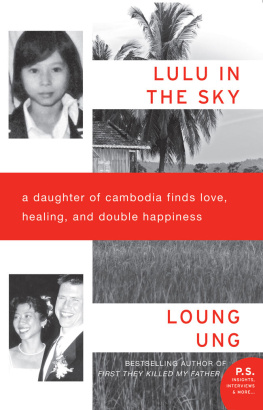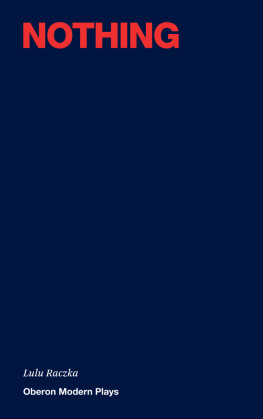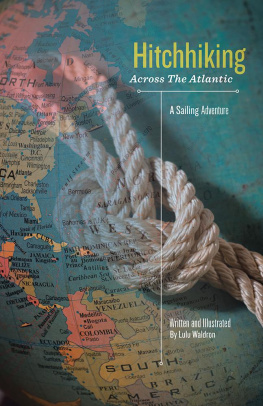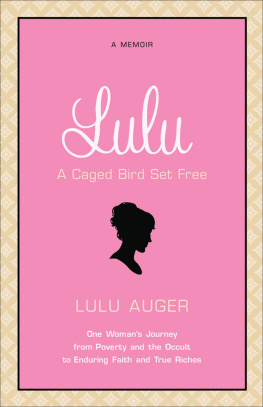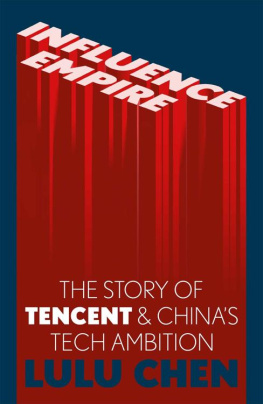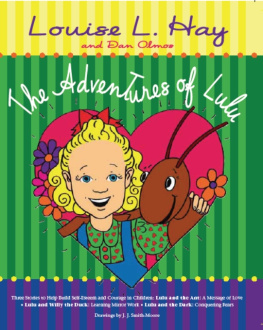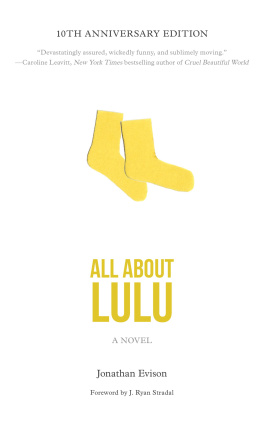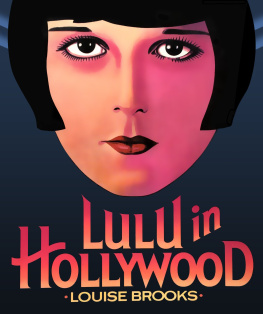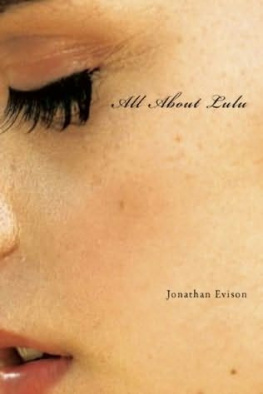Loung Ung - Lulu in the Sky
Here you can read online Loung Ung - Lulu in the Sky full text of the book (entire story) in english for free. Download pdf and epub, get meaning, cover and reviews about this ebook. year: 2012, publisher: HarperCollins, genre: Non-fiction. Description of the work, (preface) as well as reviews are available. Best literature library LitArk.com created for fans of good reading and offers a wide selection of genres:
Romance novel
Science fiction
Adventure
Detective
Science
History
Home and family
Prose
Art
Politics
Computer
Non-fiction
Religion
Business
Children
Humor
Choose a favorite category and find really read worthwhile books. Enjoy immersion in the world of imagination, feel the emotions of the characters or learn something new for yourself, make an fascinating discovery.
- Book:Lulu in the Sky
- Author:
- Publisher:HarperCollins
- Genre:
- Year:2012
- Rating:4 / 5
- Favourites:Add to favourites
- Your mark:
- 80
- 1
- 2
- 3
- 4
- 5
Lulu in the Sky: summary, description and annotation
We offer to read an annotation, description, summary or preface (depends on what the author of the book "Lulu in the Sky" wrote himself). If you haven't found the necessary information about the book — write in the comments, we will try to find it.
Lulu in the Sky — read online for free the complete book (whole text) full work
Below is the text of the book, divided by pages. System saving the place of the last page read, allows you to conveniently read the book "Lulu in the Sky" online for free, without having to search again every time where you left off. Put a bookmark, and you can go to the page where you finished reading at any time.
Font size:
Interval:
Bookmark:
lulu in the sky
a daughter of cambodia finds love,
healing, and double happiness
loung ung


For my mother, Ung Chourng
Contents
Lulu in the Sky is part memoir and part creative nonfiction. As such, this book is a culmination of research and of many formal and informal conversations, chats, and interviews with the people who touched me and the lives of my familyand hence, it serves also as a collection of their memories. Ive translated my familys Khmer and Chinese words into English and my American friends spoken English into a book narrative. To protect their privacy, Ive taken the liberty of changing some of the names, characteristics, and current locations of many of the people in this book.
My familys story was gathered over a period of fifteen years and thirty-plus trips back to Cambodia. Many of the people I interviewed are well into their sunset years, and most live in worlds without journals, birth certificates, calendars, video cameras, photographs, and other forms of documentation we in the West use to mark the passage of time. In my familys village in Kompong Speu, time is not marked by year, month, or day, but by the celebrations of Buddhist festivals, weddings, and the births of new family members. As a result, my Cambodian family lives a communal life, and through time and space, we become one anothers memory keepers. But memories are fallible, especially when combined with immense suffering, great love, and a desire to preserve the spirits of lost loved ones in the best possible light. In cases where I could fact-check, I have done so with research and field trips. When this was not possible, I chose to let my mind wander, my heart open, and my spirit roam without boundaries. In this way, I hope to capture the essence of my familys human stories. And, I hope, their humanity.
Prologue
Amah Chiem La Aw (Grandmother Who Possessed Good Blood)
Kompong Speu, Cambodia, January 2000
Daughter, my grandmother called me, her hand reaching out. Did you bring me a grandchild?
Amah, Grandmother, I addressed her in Chinese, taking her hand.
At ninety-four, my maternal amah had lived to see five of her children bring thirty-one grandchildren into the world. But Amah was a greedy woman when it came to her family. Whenever I visited from America, she would pat and pinch my bottom, telling me it was plump enough to bear her seven great-grandchildren. Even though her grandchildren had already extended the family line with forty-two great-grandchildren, she wanted more. So on this visit, my tenth or so trip in five years, Amah again pressured me.
She giggled, rocking back and forth in her wheelchair. I took Amahs hands. Her skin was soft, cool. It was January in Cambodia, our cool season, when temperatures often wavered between sixty and eighty degrees Fahrenheit, perfect for my Cambodian-American skin. But for native Cambodians, the Khmers, sixty degrees was cold. Earlier that morning, I saw our neighbor leave his house, cursing the chill and morning dew. He wore two layers of sweaters, a red wool hat, and black socks under his open-toed sandals. A woman holding a toddler followed behind him, both bundled in scarves and heavy coats.
A-moy, little daughter, Amah said, pulling me closer to her. In our family, we spoke both Khmer and Chinese, and often switched between the languages depending on with whom we were conversing. With Amah, who came from China, we spoke Chinese.
I leaned in, squeezing her hand lightly. Im here, I told her.
My familys village sits on the outskirts of Phnom Penh, Cambodias capital and largest city, where over 1.5 million people make up the hustle and bustle of big-city life. Our village is a two hours drive from the city and houses five hundred families, equaling around three thousand people. Only two hours away, but a life as different as day and night. In the city, they have electric lights, paved roads, cars, hospitals, high schools, movie theaters, tall buildings, and, in one shopping mall, mechanical moving stairs. My family told me this with the delight of rural people discovering their country for the first time, which in many ways, they were. For in the village, they lived by the light of the sun and the moon, grew their own food, slept in wood homes, and walked on winding, red dirt roads.
I turned my gaze from Amah to the small, wooden cow wagon pulling young students in white and blue uniforms on their way to school. They sat crouching, body to body, their eyes not yet alert. A row of boys sat in the front with their feet dangling in the air, their toes pinching their sandals tight on their feet. In the midst of the boys, a lone girl sat leaning against the edge, her white shirt tattered but clean, and her blue skirt falling past her shins. She turned to me and waved.
Probably to many in the world, this patch of earth was just another village among many small, dusty villages. And at first glance, like many small villages, it looked impoverished, crowded, and populated with thatched roof huts built on wooden stilts. But if visitors were to stay, if they learned to navigate around half-naked toddlers, squawking chickens, wandering pigs, and barking dogs to our psah, our outdoor market, and meet the people who called this place home, they would change their minds. In our psah, from 6 a.m. until 6 p.m., local Khmers shopped, bartered, argued, laughed, and ate. There you could still buy a bowl of steaming noodles for five hundred Khmer riels, twelve American cents, and have it served with a spoonful of local gossip or a ghost story. The vendors, farmers, butchers, fishermen, flower pickers, clockmakers, and motor repairers were sometimes friends, often family, a community of souls who had suffered together, and were now surviving and thriving.
For all these reasons, the village felt like home, even though Id lived in America ten years longer than in Cambodia. I keep returning to this community, my roots, and the place of my birth. This land, measuring only 69,898 square miles, is roughly the size of Washington State in America, and small compared to other countries Ive visited. But like its people, what it lacks in size, it more than makes up for in heart and rich history. In this nation of around fifteen million people, 90 percent are ethnic Cambodiansor Khmers, as they call themselveswith an assortment of other groups making up the rest of the population: Vietnamese, Thai, hill tribes, Chinese, and a mosaic of newly arrived Westerners. Cambodias story is diverse and fascinating. With its first national election held in 1993, modern Cambodia, which had existed for two thousand years under royal rule, was by 2000 still in its infancy as a parliamentary democracy.
Daughter... Amah called me back.
I returned to my grandmother, stared at her transparent skin covering thin blue veins like dewy sheets of rice paper. Gently, I stroked her palm, her knuckles, the length of her fingers, the tips of her opaque nails. And as I gazed at Amahs face, I understood that for me, Cambodia would always be about family. For this reason I looked forward to coming home, despite the exhausting twenty-five-hour-plus flights, the jetlag, and the keeping up of dual lives as both a daughter and a human rights activist. It was all worth it for moments like this with my family, my sister, my amah.
Wheres my great-grandchild? Amah prodded.
I laughed. It was due to such grandmotherly insistence that Cambodia had grown from five million people in 1975 to twelve million in 2000.
Font size:
Interval:
Bookmark:
Similar books «Lulu in the Sky»
Look at similar books to Lulu in the Sky. We have selected literature similar in name and meaning in the hope of providing readers with more options to find new, interesting, not yet read works.
Discussion, reviews of the book Lulu in the Sky and just readers' own opinions. Leave your comments, write what you think about the work, its meaning or the main characters. Specify what exactly you liked and what you didn't like, and why you think so.

